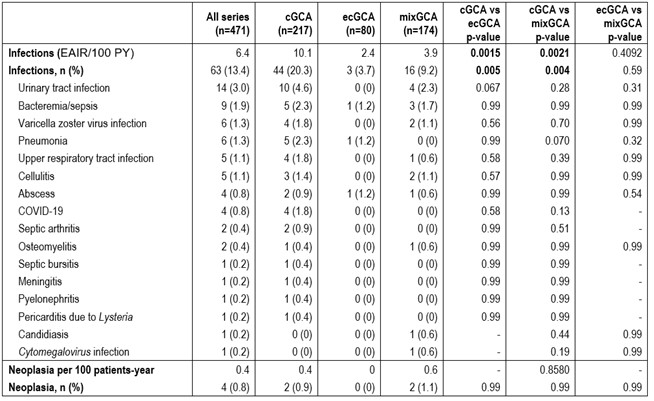Session Information
Session Type: Poster Session A
Session Time: 10:30AM-12:30PM
Background/Purpose: Infections and malignancies are two of the most feared side effects of biologic therapies. Giant cell arteritis (GCA) is a vasculitis which affects older people in whom the risk of infection and malignancies is higher.Our aim was to assess severe infections and malignancies that occurred during the follow-up of a series of patients with (GCA) treated with tocilizumab (TCZ).
Methods: Multicentre study of 471 patients diagnosed with GCA and treated with TCZ. The diagnosis of GCA was performed between 2014 and 2020 according to: a) 1990 ACR criteria, b) temporal artery biopsy, and/or c) imaging evaluation techniques. Rate of infections and malignancies are expressed as the exposure-adjusted incidence rate (EAIR) per 100 person years (PY).
Results: We studied 471 patients (342 women; mean age, 74±9 years) treated with TCZ. The phenotypic distribution was: cranial GCA (cGCA) (n=217; 46%), mixed GCA (mixGCA) (n=174; 37%), and extracranial GCA (ecGCA) (n=80; 17%).After 25.3±21.7 months of follow-up, 63 (13.4%) patients had severe infections (6.4 EAIR/100 PYs), which were more frequent in cGCA (n=44; 20.3%) (Table). The most frequent infections were: urinary tract infection (n=14; 3%), bacteriemia/sepsis (n=9; 1.9%), varicella zoster virus infection (n=6; 1.3%), pneumonia (n=6; 1.3%), upper respiratory tract infection (n=5; 1.1%), cellulitis (n=5; 1.1%), abscess (n=4; 0.8%), septic arthritis (n=2; 0.4%), osteomyelitis (n=2; 0.4%), septic bursitis (n=1; 0.2%), meningitis (n=1; 0.2%), pyelonephritis (n=1; 0.2%), pericarditis due to Lysteria (n=1; 0.2%), candidiasis (n=1; 0.2%), and Cytomegalovirus infection (n=1; 0.2%). Four (0.8%) patients developed a neoplasia (0.4 EAIR/100 PYs). The most frequent malignancies were: bladder cancer (n=1), colon cancer (n=1), lung cancer (n=1), and myelodysplastic syndrome (n=1).
Conclusion: In this wide series of TCZ in GCA of clinical practice, although TCZ is a relatively safe therapy in GCA, in our series, severe infections were observed in a non-negligible percentage rate of patients, being more frequent in cGCA. Neoplasms were rarer.
 TABLE. Severe infections and malignancies documented in the 471 GCA patients treated with tocilizumab.
TABLE. Severe infections and malignancies documented in the 471 GCA patients treated with tocilizumab.
To cite this abstract in AMA style:
Martin-Gutierrez A, Loricera J, Aldasoro Cáceres V, Maiz O, de Miguel E, Galíndez Agirregoikoa E, Ferraz Amaro I, Castañeda S, Blanco R. Severe infections and malignancies in patients with cranial and extracranial giant cell arteritis treated with tocilizumab. National multicenter study of 471 patients of clinical practice [abstract]. Arthritis Rheumatol. 2025; 77 (suppl 9). https://acrabstracts.org/abstract/severe-infections-and-malignancies-in-patients-with-cranial-and-extracranial-giant-cell-arteritis-treated-with-tocilizumab-national-multicenter-study-of-471-patients-of-clinical-practice/. Accessed .« Back to ACR Convergence 2025
ACR Meeting Abstracts - https://acrabstracts.org/abstract/severe-infections-and-malignancies-in-patients-with-cranial-and-extracranial-giant-cell-arteritis-treated-with-tocilizumab-national-multicenter-study-of-471-patients-of-clinical-practice/
